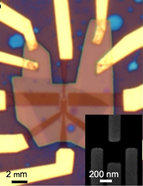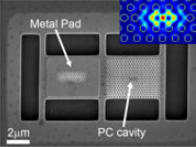

Attojoule Nano-Optoelectronics





AFOSR MURI: Ultralow Power, Ultrafast, Integrated Nano-Optoelectronics
Team:
Andrea Alù
, The University of Texas at Austin (PI)
Mark Brongersma
, Stanford University (co-PI)
Nader Engheta
, University of Pennsylvania (co-PI)
Shanhui Fan
, Stanford University (co-PI)
Mikhail Lukin
, Harvard University (co-PI)
David Miller
, Stanford University (co-PI)
Hongkun Park
, Harvard University (co-PI)
Jelena Vuckovic
, Stanford University (co-PI)
Philip Kim
, Harvard University (Consulting)
Roel Baets
, University of Ghent (International)
Albert Polman
, AMOLF (International)

OUR
GOALS
FOR THIS PROGRAM:
•
Introduce and develop revolutionary concepts to model, design, analyze, fabricate and
characterize ultralow-power, ultrafast, high-density, compact, scalable optoelectronic
nanodevices and dense arrays of them, envisioning the next generation of integrated
nanophotonic systems
•
Realize nanophotonic devices enabling operations in the femtosecond, nanometer and
attojoule ranges, all within a CMOS-compatible, directly scalable, room-temperature
environment at telecommunication wavelengths

TECHNICAL APPROACH:
•
Hybrid material platform supporting novel phenomena that may significantly push the limits
of integration and speed, including quantum effects, 2D materials, metamaterials, heavily-doped
semiconductors, and plasmonic materials
•
Novel theoretical tools, including analytical and numerical methods, as well as fundamental
bounds on efficiency and speed, capturing the involved complex multiphysics problems,
and including and integrating plasmonic, electronic, nonlinear and quantum effects
•
Nanofabrication techniques to realize CMOS-compatible, cost-effective, ultralow power,
and ultrafast nanodevices on hybrid substrates
•
Fundamental physics advances in quantum optics, plasmonics, strong light-matter interactions
•
New nanophotonics concepts, applying metatronics, epsilon-near-zero, hyperbolic metasurfaces,
and meta-electronics
2023 Meeting Agenda
2021 Meeting Agenda
2020 Meeting Agenda


















